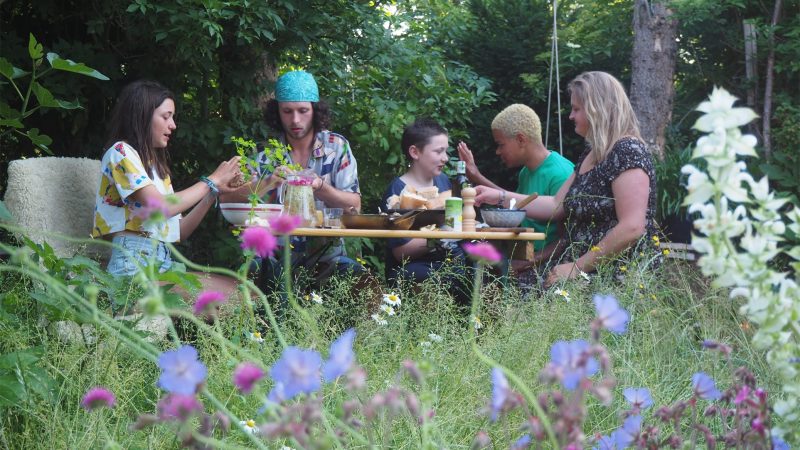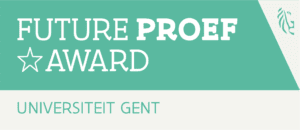Self-transformation towards degrowth: emancipating ourselves to create a truly sustainable society


Hell on earth is getting closer by the day and still we seem to be frozen; completely unable to effectively do anything about the ongoing ecological crisis. We are stuck in destructive societies, stuck in mechanisms that cause life-threatening situations for a growing number of people.
To be able to change the ways in which we live together, produce, and cooperate with (or merely exploit) other humans and non-humans, we need to change ourselves first. Zara imagines ways of tackling the biggest issue of our time by freeing our mind from internalised structures of thinking.
Self-destruction
In 2023, we find ourselves in an absurd situation. The system that promises us more food, more fun, more stuff, and more status (basically more of everything we seem to enjoy), and claims to be in our best interest, is actively destroying the one thing we and our children really need in order to continue a flourishing life: a safe and pleasant environment.

‘Save the earth!!!!!!!!!!’ Foto: Zara Lobst
We seem to be stuck in a circle of self-destruction. We will not break free from it as long as we are unable to change our societal organisation. Much of our economic and social organisation is built around pursuing unlimited economic growth. This growth is normally accompanied by an increase in energy and material use. Therefore, ongoing growth seems impossible in a world in which resources are limited.
Towards a post-growth society
The theory of degrowth offers a possible solution. Degrowth theory advocates for replacing the main societal goal of economic growth by the goal to create as much social well-being as possible within the limits of our planet. Material and energy consumption in affluent countries must be drastically reduced in order to share available resources more equitably between the global North and the global South and between current and future generations.
In order to bring degrowth or any other theory that aims to establish a truly sustainable society into practice, deep and structural changes in our way of living are necessary. These changes can only happen if members of society accept them internally and start to actively bring them into practice.
 Self-grown vegetables. Foto: Zara Lobst
Self-grown vegetables. Foto: Zara Lobst
Beyond the growth imperative
Currently, however, our way of thinking seems to be stuck in internalised patterns. Degrowth scholar Jason Hickel writes that the idea that we need economic growth in order to live better is very deeply embedded in our current Western society. Most people in Western and affluent countries have embodied the growth ideal: it has occupied our imagination, language, and social relations, making it nearly impossible to imagine a future without economic growth.
A worldview, in which our planet and all its non-human inhabitants and properties are merely seen as exploitable resources, seems to have captured us. Scientist and philosopher Robin Wall Kimmerer points out that to stop the ongoing destruction of our environment, we need to change ourselves.
Kimmerer and many other scholars from various fields share the views that we need to change our perception, priorities, and values in order to free ourselves from this worldview and enables ourselves to start living in a sustainable, non-destructive way.
Bhaskar’s framework
Within Lobst’s thesis, philosopher Roy Bhaskar offers a theory on the role that a different view on the world can play within shaping a different society. In Bhaskar’s theory, this part of ourselves (our worldviews) is called the dimension of our ‘inner being’.
According to his theory this inner being is one of four dimensions in which every act and every event simultaneously take place. These dimensions, which he calls planes, are interdependent and influence each other constantly. The figure below illustrates these four dimensions and their constant interaction.

Figure: Simplified scheme of Bhaskar’s theory of being. by Zara Lobst
According to Bhaskar, all transformations in our society depend on the actions of humans. We are born into an existing situation, which we then either reinforce or change by our actions.
As Bhaskar argues, the plane of inner being shapes all our actions. Our views and values determine how we decide to act in an occurring situation. For example, if a farmer begins to see animals as his companions rather than his ‘livestock’, this shapes how he will treat sick or unproductive animals.
In order to act differently we need to change our inner being first.
Transforming ourselves
Changing our inner being entails transformation within ourselves by ourselves: self-transformation. Self-transformation does, of course, not happen immediately. Creating large shifts in oneself is a long-term process that demands lots of determination.
As Bhaskar points out, all societal transformation depends on the self-transformation of agents. Transforming our current capitalist growth-based society into a degrowth society can only happen if we, as members of our society, collectively self-transform in order to enable ourselves to shape our acts in ways that transform society.
This makes research on transformation on the plane of inner being essential, in order to create a society that has degrowth as its core value.
Self-transformation routes
The main goal of Lobst was to look into the different types of transformation that need to take place within ourselves in order to make it possible to actualize degrowth. She derived three different concrete pathways from a very general proposal for changes in the inner being by scholars Buch-Hansen and Nesterova. She then deepened and extended these paths with theories and insights that are based on a broad literature study.
 Figure: Three proposed pathways of self-transformation. by Zara Lobst
Figure: Three proposed pathways of self-transformation. by Zara Lobst
The first path Lobst proposes is the transformation from an ego-centric, individualistic attitude, to one in which you are aware of your connectedness and interdependence with all other beings. This involves a feeling of being part of nature instead of seeing oneself (and human’s in general) as somehow separated from it. This shift in (world)view could cause persons to feel compassion and concern for non-human beings, which is an important incentive to create a society that is no longer based on the exploitation of nature.
The second transformation that she proposes is one of living mostly in a mode of having to living in a mode of being. Philosopher and psychologist Erich Fromm advocates for this shift in modes that involves letting your well-being no longer be determined by your amount of status and (material) possessions but instead by personal and social experiences such as friendship, being in harmony with your surroundings, or creating art. Going through this shift enables you to voluntarily choose a simpler, less-polluting lifestyle.
The third self-transformation path is the shift from feeling that you are in a situation of scarcity to realizing that you actually live on a planet of abundance. This involves recognizing that there are enough resources for everyone to fulfil their basic needs, if we divide them in a fair way. This sense of abundance can be triggered by cultivating gratitude towards nature and everything we receive from it.
 Foto: Being in harmony with your surroundings. by Peter Rappoldt
Foto: Being in harmony with your surroundings. by Peter Rappoldt
Following all three of these paths that Zara worked out in her thesis, could enable a person to shape their future action (more) in accordance with degrowth. However, these paths are certainly not meant to be fixed or complete. Self-transformation can take many forms.
Self-transformation in action
It is important to know that even if this self-transformation process takes place within oneself, this does not mean that the incentive for this process also needs to come from within oneself.
In a top-down approach, self-transformation could be initiated by governments and their institutions. This could, for example, happen by offering certain (alternative) views and values in our educational systems or through our cultural institutions (art, films, theatre, and religious practices).
 Foto: Ecological education in school. by Sigrun Lobst
Foto: Ecological education in school. by Sigrun Lobst
An often mentioned, very concrete, policy to free people’s thoughts and thereby opening up a space for reflection on their values and views, would be a limitation or complete ban on advertisement.
Within a bottom-up approach, groups of (organized) individuals would have to be the main drivers in encouraging processes of self-transformation. If one or several of the proposed pathways are already followed by the members of a certain group, this could inspire actors that are in contact with them to also engage in some degree of self-transformation.
Case-study: self-transformation in ecovillages
Ecovillages can be seen as an example of grass-root initiatives that practice the degrowth ideal. Therefore, Lobst decided to take a look at how much the three proposed pathways are present within ecovillage practice and theory.
Ecovillages can be seen as an example of (mini-)societies where high levels of human wellbeing are reached without economic growth. The term refers to places either inside or outside of cities, in which a group of people practice communal living in an (often radically) sustainable way.
 Foto: Ecological education in school. by Sigrun Lobst
Foto: Ecological education in school. by Sigrun Lobst
This case-study made it clear for Lobst that engaging in transformations of the inner being appears to be an important component of the lives of ecovillagers. It can be said that each of the three proposed transformation paths is present to some extent in both the ideology and daily practice of ecovillages. The first two transformations in particular play a central role within the ecovillage discourse.
The inevitability of self-transformation
Overall, it can be concluded that changes in our worldview are inevitable if we are to stand a chance of stopping the destruction of our environment. It’s time to acknowledge the importance of internal change when aiming to establish a truly sustainable society. Self-transformation is an essential step in the process of keeping our planet habitable.
This is a call to engage yourself in processes of self-transformation and inspire others to do the same.
